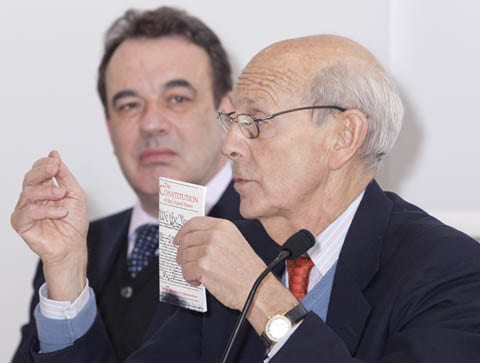US Supreme Court Justice Breyer at UCL Laws
By Ruth Grenville, on 22 March 2011
On 17 March, UCL’s Judicial Institute was delighted to host a visit by US Supreme Court Justice Stephen Breyer, a rare occasion for our law students to hear about the American justice system, direct from the source.

Justice Breyer brandishes a copy of the US constitution, as UCL Laws Vice-Dean for Staffing Professor John Lowry looks on
In a frank discussion, Justice Breyer covered topics addressed in his recent book Making Our Democracy Work: A Judge’s View (Knopf Publishing Group, 2010). He clarified what the US Supreme Court decides, why judges decide it, and how. He also invited questions from students and pulled no punches in a lively, interactive Q&A session. Students from the Faculty of Laws share their thoughts on his visit:
Sarah Walker: Justice Breyer’s talk was clear, insightful, and thought-provoking. As an English law student studying judicial decision-making, his visit was a rare opportunity for me to gain an insight into not only the US legal system but, crucially, the workings of its highest court, according to one of its venerable Justices. One of the most interesting parts of the talk was when Justice Breyer asked a question I had never thought to ask before: why do people obey the US Supreme Court? As he noted, they are a small unelected body functioning behind closed doors in an unknown way, making the obeyance all the more surprising. Justice Breyer’s mission is to increase knowledge and understanding of the workings of the US Supreme Court, his concern being that so few people have an accurate understanding of a body which, potentially, makes such a significant impact upon their everyday lives. His accessibility, honesty and wit make his mission all the more achievable.
Also of interest were some insightful questions from the floor, challenging Justice Breyer on his statements that politics and ideology do not come into the judicial decision-making process, and asking if he would support televising oral proceedings before the US Supreme Court. On the first question, Justice Breyer made clear that although he was aware that millions of lives could be affected by his decision he did not consider the popular opinion of the public in his decision-making process; in fact, it is the responsibility of a judge to make unpopular decisions. With regard to the second question, he cautioned that if oral proceedings are televised it should be with the knowledge that there have been vast quantities of written proceedings taking place beforehand and a considerable amount of discussion between the Justices as to the correct result yet to take place, to provide a fuller picture of the US Supreme Court’s functions to work towards his mission of spreading understanding.
Christine A. Dixon: Enjoyable! Mr. Justice Breyer’s lecture was witty and engaging. I was particularly touched when he discussed the constitution of the United States of America and his belief that it is meant to protect the least popular in society. His fierce discussion of Brown v. The Board of Education [the Supreme Court’s landmark decision on segregation] convinced me that he truly believes in the constitution, a copy of which he had neatly folded in his breast pocket, and in his role as a Supreme Court Justice!
Orkhan Amashov: It has been a great been honour to welcome Justice Breyer at UCL. It was not a typical lecture dedicated to the expression of theoretical thoughts only, but a discussion covering issues from technicalities involved in the activity of Justices to deep analysis as to the fundamentals of US democracy and constitutional principles. Justice Breyer’s speech has provided invaluable insights into the workings of the US Constitution, governmental system and the Supreme Court’s role in enhancing constitutional values in practice. I have been particularly impressed with the way in which he analysed how core values enshrined in the Constitution are kept and adapted to changing circumstances. He gave a full and extraordinary picture of the sophisticated legal-political construction within which the system functions. He was not idealist in his analysis of US court history, emphasizing both, in his words, ‘terrible’ and extraordinary future-oriented decisions. Justice Breyer’s speech has also been marked with very sincere revelations of how a typical day for a Supreme Court Justice is constructed.
 Close
Close

